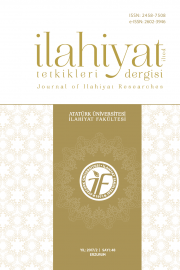Şiî-İmâmî Kaynaklarda Ebû Hanîfe Algısı ve Yöneltilen Suçlamalar
The Perception of Abû Hanifah in Shiite Sources and the Accusations of Related to Abu Hanifa
Author(s): Hanifi ŞAHİNSubject(s): Theology and Religion, Islam studies, Philosophy of Religion
Published by: Atatürk Üniversitesi İlahiyat Fakültesi
Keywords: Abu Hanifah; Ashab al-Hadith; Ahl al-Ra’y; Shia; Imamiyyah;
Summary/Abstract: Abu Hanifah, even though, had a positive view of the Ahl al-Bayt, there is a strong opposition to Abu Hanifah in both the first period’s and the next period's Imamiyya sources. This contrast would result in his damnation and described as nâsibî. The basic reason for the criticism of Abu Hanifah is that, he opened the mind to the understanding and interpretation of religion. In the Shiite sources, rhetoric is given to Abu Hanifah in the form of “If Ali judges, I will also judge”. With this narration, they are accusing Abu Hanifah being arbitrary and this idea should be vigilantly distracted from the Imams accepted as the only authority in understanding religion. Rationalization in religious thought is to break from being connected with narrations and not to recognize an authority except the reason. This represents a very serious break with the view of Shi'i, that it was built his ontology on Imams. For this reason, the Shi'i wants to avoid not only Abu Hanifah's thoughts, but also the thought of every thought which will result in acting independently of Imams. The fact that the Shiites stay away from the Ijtihad and Qiyas is also a result of this view. In this paper, we will look at the grounds and reasons for the criticism of Abu Hanifah in Shiite Imamiyya sources and we will try to examine its consequences in the Shi'a thought. Our basic references will be al-Kutub al-Arbaa.
Journal: İlahiyat Tetkikleri Dergisi
- Issue Year: 2017
- Issue No: 48
- Page Range: 119-140
- Page Count: 22
- Language: Turkish

